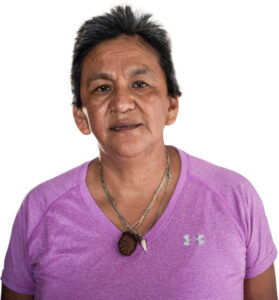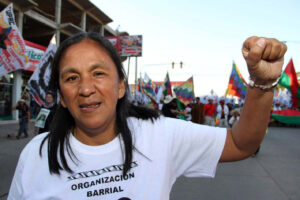Milagro Sala
Credentials
Humanitarian Cause
Human Rights, Human Rights Advocacy, Minorities’ Rights, Community Sensitization on Human Rights and Civic Engagement
Impact Location
Argentina
Occupation
Activist / Founder of Tupac Amaru Neighborhood Association
Photo Gallery
About
Milagro Sala is an Argentinian social activist, known for her enduring fight for Indigenous and underprivileged communities. As the leader of the Tupac Amaru Neighborhood Organization in Jujuy, Argentina, she is at the forefront of a movement dedicated to addressing pressing social and economic inequalities. The Tupac Amaru organization, which she co-founded, has been central to this mission, providing essential services such as food, medical care, education, and employment opportunities for marginalized communities. Since January 2016, Ms. Sala has been arrested several times and tried for alleged transgressions. While imprisoned, her health has deteriorated, and she is currently under house arrest.
Driven by her experiences as an Indigenous woman, Sala’s journey to social advocacy began under challenging circumstances. Born in 1964 and abandoned as an infant, she was adopted by a middle-class family but later endured years on the streets, where she faced poverty and societal exclusion.
Inspired by figures like Bolivia’s Evo Morales, she co-founded the Tupac Amaru organization, named after the 18th-century Inca revolutionary leader, to champion the rights of impoverished and Indigenous groups in northern Argentina. Under her guidance, the expanded its reach to address issues of social justice and Indigenous rights, with Sala becoming a prominent advocate in the fight against systemic poverty.
Sala and her organization took a different approach to social assistance by emphasizing empowerment over dependency. For instance, Tupac Amaru’s members were encouraged to actively participate in the construction of their own homes and community spaces, thus fostering a sense of ownership and self-sufficiency within their communities.
A significant turning point came in December 2015, with the election of Jujuy’s Governor Gerardo Morales, a Radical Party member and political ally of Argentina’s then-president, Mauricio Macri. One of Morales’ first acts was to issue an executive order requiring social movements to register officially to continue their work, a decision viewed by many as a direct attempt to undermine Tupac Amaru’s community-based model. In response, Sala led a peaceful encampment outside the Governance Building, demanding that Morales restore funding and resources for the cooperative jobs the organization had created. On January 16, 2016, she was arrested for her role in organizing this protest, marking the beginning of a lengthy and turbulent legal battle.
Since her initial arrest, Sala has faced multiple charges in eleven different cases, primarily related to her role in Tupac Amaru’s social and economic activities. The most severe of these charges resulted in a 13-year prison sentence for allegedly misappropriating public funds allocated for housing projects. Critics argue that the prosecution in this case lacked due process, with Sala’s defense team contending that her evidence and witnesses were largely dismissed. Organizations such as Amnesty International and the Center for Legal and Social Studies (CELS) have documented these irregularities, highlighting Sala’s treatment as a case of political persecution aimed at suppressing dissenting voices within Argentina’s Indigenous and poor communities.
In 2017, the Inter-American Commission on Human Rights recommended that Argentine authorities transfer her to house arrest, citing her fragile health. This recommendation was initially resisted by local authorities in Jujuy, who only acquiesced after intervention from the Inter-American Court. Since then, Sala’s health has continued to deteriorate, with recent reports of blood clots threatening her life. Despite her condition, her requests for regular medical treatment have reportedly been denied or delayed by local authorities.
Support for Sala remains strong among human rights organizations, Indigenous groups, and social movements across Latin America, many of whom see her case as emblematic of the broader struggle for Indigenous rights and social justice. The United Nations Working Group on Arbitrary Detention issued a formal call for her release, describing her detention as arbitrary and criticizing the use of vague charges to keep her imprisoned. These international bodies argue that the Argentine legal system’s handling of her case undermines the principles of judicial independence and fairness.
Milagro Sala’s work has left a profound impact on Argentina’s poorest communities. Her advocacy reflects a deep commitment to social equity, underscored by an unyielding belief in the transformative power of collective action. For those who support her, Sala represents more than a social leader; she symbolizes resilience, a figure willing to risk her freedom for the promise of a more just society.


